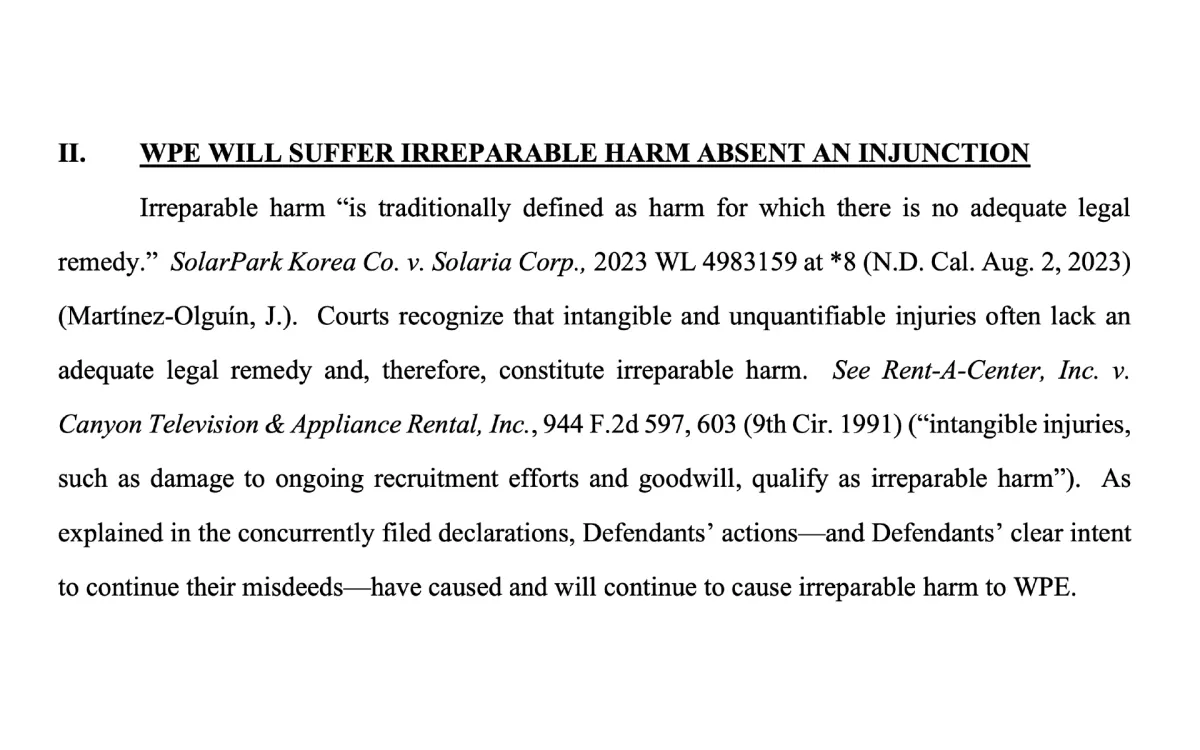
On October 18, 2024, WPEngine filed a motion for preliminary injunction in its federal lawsuit (Case 3:24-cv-06917-AMO) against Automattic and Matthew Charles Mullenweg in the United States District Court for the Northern District of California. This legal action, initially filed on October 2, has exposed a complex web of allegations involving extortion, cyber attacks, and unfair business practices within the WordPress ecosystem.
Legal Arguments and Claims
WPEngine's motion for preliminary injunction outlines several key arguments:
Computer Fraud and Abuse Act (CFAA) Violations
WPEngine alleges that the defendants violated the CFAA by engaging in extortionate behavior involving protected computers. The company claims that Automattic and Mullenweg threatened to cause damage to WPEngine's systems, those behind WordPress, and those of WPEngine's customers unless WPEngine agreed to pay a large sum of money.
The lawsuit details how Mullenweg allegedly sent text messages threatening a "scorched earth nuclear approach" if WPEngine did not agree to pay tens of millions of dollars annually for a purported "trademark license" within 24 hours. These threats were followed by actions that impaired WPEngine's access to wordpress.org and disrupted services to its customers.
Unfair Competition Law (UCL) Violations
WPEngine argues that the defendants' actions violate California's Unfair Competition Law. The company contends that Automattic and Mullenweg engaged in unlawful, unfair, and fraudulent business practices, including their extortionate demands and subsequent actions to disrupt WPEngine's business operations.
Intentional Interference with Contractual Relations
The lawsuit alleges that the defendants deliberately interfered with WPEngine's contracts with its customers. WPEngine claims that Automattic and Mullenweg knowingly took actions designed to cause WPEngine's customers to breach or terminate their contracts, including blocking access to essential WordPress resources and spreading false information about WPEngine's services.
Attempted Extortion
WPEngine asserts that the defendants' actions constitute attempted extortion under common law. The company points to the defendants' demands for payment under threat of causing harm to WPEngine's business as evidence of this claim.
Evidence and Alleged Actions
The motion for preliminary injunction provides detailed accounts of the defendants' alleged actions:
- Blocking Access to WordPress Resources: On September 24, 2024, WPEngine employees found their wordpress.org accounts disabled, preventing them from updating plugins distributed through the platform.
- Disrupting Customer Access: On September 25, 2024, Mullenweg allegedly banned WPE customers who host their WordPress installations on WPE servers from accessing wordpress.org resources through the administration panel.
- False Security Alerts: After the initial lawsuit filing, Automattic began sending purported security alerts about WPEngine's "ACF" plugin, which WPEngine claims were acts of harassment.
- Takeover of the ACF Plugin: On October 12, 2024, WordPress.org initiated what WPEngine calls an "unprecedented, hostile takeover" of the Advanced Custom Fields (ACF) plugin, rebranding it as "Secure Custom Fields" (SCF).
- Loyalty Pledge Requirements: On October 8, 2024, Mullenweg allegedly changed the login page for wordpress.org to require all WordPress users to take a loyalty pledge, stating they are not affiliated with WPEngine.
Irreparable Harm and Public Interest
WPEngine argues that it will suffer irreparable harm without immediate court intervention. The company cites loss of customers, damage to its reputation, and erosion of market share as ongoing consequences of the defendants' actions. WPEngine reports a 14% increase in cancellation requests and a 29% drop in new customers from its self-service channel in the wake of the defendants' actions.
Moreover, WPEngine contends that the public interest favors granting the injunction. The company argues that the defendants' actions are causing harm not only to WPEngine but also to its customers and the broader WordPress community. Website operators are facing potential disruptions and increased security risks, while other WordPress service providers are experiencing a loss of trust in the platform's stability.
Relief Sought
WPEngine is seeking a preliminary injunction that would:
- Prevent the defendants from interfering with WPEngine's access to the WordPress community, including wordpress.org and the WordPress Plugin Directory.
- Restore WPEngine's control over its plugins, including ACF.
- Prohibit the defendants from engaging in any further acts of extortion or tortious interference with respect to WPEngine.
The company argues that this relief is necessary to restore and preserve the status quo that existed prior to September 20, 2024, when the alleged extortionate demands began.
Broader Implications
This case has far-reaching implications for the WordPress ecosystem and the open-source software community at large. It raises critical questions about the balance of power between platform creators and the businesses built upon their technologies. The outcome could set important precedents for how disputes between major players in open-source communities are resolved and the extent to which platform founders can exert control over the ecosystems they've created.
As Case 3:24-cv-06917-AMO proceeds through the federal court system, it will be closely watched by the WordPress community, tech industry observers, and legal experts. The decisions made in this case could potentially reshape the landscape of open-source software development and the relationships between hosting providers, plugin developers, and platform founders.
The hearing for the preliminary injunction motion is scheduled for March 6, 2025, before the Honorable Araceli Martínez-Olguín in Courtroom 10 of the United States District Court for the Northern District of California.

